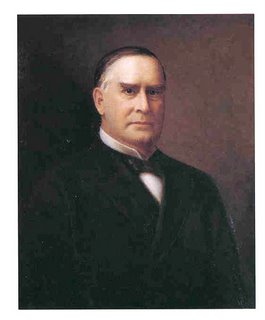William Mckinley

Acoording to William McKinley, "It is sometimes hard to determine what is best to do and the best thing to do is oftentimes the hardest. The prophet of evil would do nothing because he flinches at sacrifice and effort, and to do nothing is easiest and involves the least cost."
In reference to the Spanish American war and america's move into the Phillipines, it is my opinion that former President McKinley feels that it was the best decision for America to interfere with the structure of the Phillipenes. And that it would be almost cowardly if the U.S .minded their own business just because it would cost less. But the U.S. would never do that no, not if we could benefit in some shape or form from it.
"The Future of the Philipino Islands is in the hands of the American People"
He goes on to refer to a ratified treaty which gives the executive department of our government the responsibility of preseving peace and protecting life and property as well as gives the fillipinos a "guiding hand" and influences them to liberization and uplifting education. He refers to them as free and enfranchised so that now they would look upon the U.S. as their emanicipators. Our government isn't included in the population of the phillipines yet we control the preservation of peace, life and property and the filipinos should see us as their "american emanicipators" and not their "american masters".
It sounds as If as their "emancipators" we just set them free from a group of people who probably felt they were doing the same thing.


1 Comments:
A substantive post. Why is everything in italics?
What are the arguments that President McKinley is using to legitimate the American occupation?
What does he feel is convincing to the public? What kind of symbolism? What kind of language? What kind of rhetoric is he using? What are the important terms?
Post a Comment
<< Home